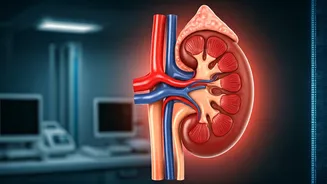What is Kidney Disease?
Kidney disease, frequently referred to as renal disease, encompasses a range of conditions affecting the kidneys' ability to filter waste and excess fluids
from the blood. The kidneys are essential organs, working as filters to remove harmful substances and toxins from the bloodstream. When kidneys are damaged, they may not function as intended, which can lead to a buildup of waste and fluids in the body. This can subsequently result in various health problems. Various factors can damage the kidneys, including diabetes, high blood pressure, and other underlying medical conditions. Chronic kidney disease (CKD) is a progressive condition, meaning it worsens over time. It is vital to understand the causes and the potential consequences of kidney disease.
Early Warning Signs
Early detection is critical in managing kidney disease effectively. Recognizing the initial signs can make a significant difference in delaying the progression of the condition. Several subtle indicators might suggest kidney problems. These include frequent urination, especially at night, as the kidneys struggle to regulate fluid balance. Swelling in the ankles, feet, or hands may also occur due to fluid retention. Fatigue, a general feeling of tiredness or weakness, can also indicate the kidneys are not properly removing waste from the body. Other symptoms include changes in urine, such as foamy urine or blood in the urine. Persistent itching, skin rashes, and loss of appetite are also potential red flags. Anyone experiencing these symptoms should consult a healthcare professional for proper evaluation and timely intervention.
Risk Factors Explained
Several factors can increase a person's risk of developing kidney disease. Some risk factors are controllable through lifestyle changes, while others are based on genetics or underlying health conditions. Diabetes is a leading cause, with high blood sugar levels damaging the small blood vessels in the kidneys. High blood pressure, or hypertension, is another major risk factor, as it can strain the kidneys, causing damage over time. Family history also plays a role, as a genetic predisposition can increase the likelihood of kidney disease. Age is also a consideration; the risk increases with age. Other factors include obesity, smoking, and the use of certain medications, such as nonsteroidal anti-inflammatory drugs (NSAIDs). Regular check-ups and proactive health management are crucial, especially for those with multiple risk factors.
Prevention Strategies
Preventing kidney disease involves adopting healthy habits and managing existing health conditions. Maintaining a healthy lifestyle is the first step in kidney health. Regular exercise, such as brisk walking, swimming, or cycling, can help control blood pressure and improve overall health. A balanced diet low in sodium, processed foods, and added sugars is essential. Controlling blood sugar levels is critical for those with diabetes, so managing the condition is vital. Likewise, managing high blood pressure through medication, diet, and exercise can protect the kidneys. Limiting alcohol consumption and avoiding smoking can also reduce the risk of kidney damage. Regular health check-ups and screenings can help detect problems early on, allowing for timely intervention and treatment.
Stages of CKD
Chronic Kidney Disease (CKD) is classified into five stages, based on the kidney's ability to filter waste, which is measured by the glomerular filtration rate (GFR). Stage 1 involves some kidney damage, with a normal or high GFR of 90 or above. Stage 2 features mild kidney damage, with a GFR between 60-89. Stage 3, divided into 3a (GFR 45-59) and 3b (GFR 30-44), indicates moderate kidney damage. Stage 4 signifies severe kidney damage, with a GFR between 15-29. Stage 5, also known as end-stage renal disease (ESRD), is the most severe, with a GFR less than 15. The treatment approaches vary with each stage, ranging from lifestyle modifications and medications in the early stages to dialysis or kidney transplant in the advanced stages.
Treatment and Management
The treatment for kidney disease varies greatly depending on the stage and severity. Early-stage kidney disease may involve lifestyle changes, such as dietary adjustments and medications to control blood pressure, blood sugar, and cholesterol levels. Medications may also be prescribed to protect the kidneys. As the disease progresses, dialysis or a kidney transplant may become necessary. Dialysis involves filtering the blood using a machine, a process that can be done at a dialysis center or at home. A kidney transplant involves replacing the damaged kidneys with a healthy one from a donor. Regular monitoring by a nephrologist, or kidney specialist, is essential throughout the treatment process. Support groups and patient education programs can also provide valuable resources and assistance.
Diet and Nutrition
Dietary choices play a crucial role in managing kidney disease. The goal of a kidney-friendly diet is to reduce the workload on the kidneys and to prevent the buildup of waste products in the blood. Restricting sodium intake is essential to control blood pressure. Limiting protein intake may be necessary, as excess protein can put extra strain on the kidneys. Foods high in phosphorus, such as dairy products, nuts, and processed foods, may also need to be limited. Potassium-rich foods, like bananas and oranges, might also need to be restricted, depending on the stage of the disease. A registered dietitian can provide personalized guidance on creating a renal diet that meets an individual's specific needs, helping them manage their condition while enjoying a balanced and nutritious eating plan.




















